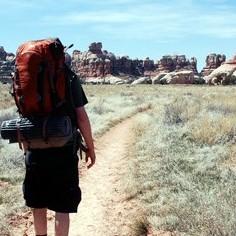I have spent many hours trying to understand why people avoid or deny bad things that are happening. I know they are intelligent and very capable people. It is not a matter of ignorance. It is pure denial, fear, and anxiety. The fear is that something is going to happen, or did happen, that they cannot stop or control, and that they are not sure they can survive.
Years ago, I was a chaplain at Parkland Memorial Hospital in Dallas, Texas. I loved the job. I remember a day that I received a page from a head nurse from the recovery ward. I did not spend much time there as it was recovery, not crisis. When I arrived, the nurse pointed to an elderly woman sitting in the waiting area. She told me that she had been there the day before and had spent the night, but she had no relatives in the hospital. I walked over to the woman and sat beside her. I introduced myself and asked her if she was waiting for a relative or a friend. She said that she didn’t have a relative or friend in the hospital but that her husband was here three years ago and had died. She said that she felt close to him in the hospital, then she began to cry softly.
I asked her to tell me about him. He was a wonderful father, husband, and friend. She said that they had been married for over fifty-five years; he had a heart attack and was recovering. She pointed to a nearby room where he had been, and said she’d stayed beside him for four days and four nights.
The doctor said he was doing fine, then Joe, her husband, told her to go home and rest. He promised that he would be okay until she got back. She didn’t want to leave him, but he insisted. She was so very tired, so she finally agreed. She went home and only slept four hours before getting dressed and coming back. When she got to his room, a nurse met her and told her that he’d died.
She said that she did not mean to leave him. He had died alone, and she never got to tell him goodbye. She said, “I left him alone.” By now, I am crying. I said how sorry I was, and she cried on my shoulder for a few minutes. Then with a stoic look, she told me that is why she comes here to wait, “I made a mistake. I left.”
I took her hand and asked, “Joe was a wonderful husband, right? She nodded. Then I asked her if she thought he was disappointed in her leaving. “No,” she said, “he sent me home to rest.” So, I asked her, if the roles were reversed, if she would want Joe to feel guilty. She assured me that she would not want that, because he would not have known that would be the last time he would see her. Then I asked her what Joe would tell her if he could. “He would say, Rose, I love you, and you do not need to be sad. He would say that I should take care of our grandchildren and be happy. He would say that he is not here, so go home and cook.” I looked at her and said, “I know Joe just spoke that to you.” She smiled back at me.
Now I asked her what she wanted to tell Joe that she had not been able to do three years ago. She told me, with her eyes closed, “Joe, I love you. I am sorry that I was not here, but I will see you again. Goodbye, Dear.” She then looked up at me with a look of great relief and smiled. She said, “Thank you so much,” then she picked up her purse and looked at me and said, “I’d better go home and cook,” with a big smile.
When we look ahead at the circumstances that surround all of us, it makes us enter into a state of denial. We know what is coming, or we are afraid of what may come. Given the present state of affairs, we all want to go back to “normal.” Life does not go backward . . . only forward. Forward is completely uncertain, and there is not much to look forward to.
But look up and realize that Jesus is the same yesterday, today, and forever (Hebrews 13:8), and he said to cast your cares on Him, because he careth for you (1 Peter 5:7). Let’s agree right now on this one thing: Jesus will never leave us nor forsake us even to the end of the world (Hebrews 13:5).
Keep the faith and push on.
Your friend,
The Sojourner (Pa)







